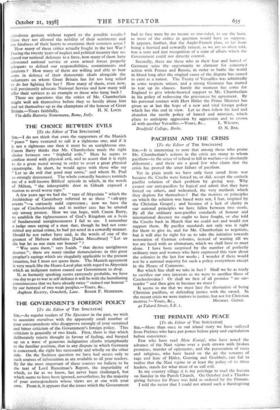THE GOVERNMENT'S FOREIGN POLICY [To the Editor of THE SPECTATOR]
Sta,—As regular readers of The Spectator in the past, we wish to associate ourselves with the apparently small number of your correspondents who disapprove strongly of your sustained and bitter criticism of the Government's foreign policy. This criticism is generally of two kinds. First,- there is that which deliberately rejects thought in favour of feeling, and buoyed up on a wave of generous indignation climbs triumphantly to the familiar position, that in any dispute in which Germany is concerned, the right lies necessarily and wholly on the other side. On the Sudeten question we have had access only to such sources of information as are available to all your readers. By far the most important of these sources we believe to be the text of Lord Runciman's Report, the impartiality of which, so far as we know, has never been challenged, but which seems to have been ignored, nevertheless, by the majority of your correspondents whose views are at one with your own. From it, it appears that the issues which the Government
had to face were by no means so one-sided, to say the least, as most of the critics in question would have us suppose. It appears, further, that the Anglo-French plan, so far from being a hurried and cowardly retreat, as we are so often told, was a sane and just recognition of a state of affairs which the Government could not directly control.
Secondly, there are those who in their fear and hatred of Germany seize the opportunity to clamour for concerted action with France and Russia, in order to bathe the world in blood long after the original cause of the dispute has ceased to exist as a nation. The Treaty of Versailles was admittedly in some respects unjust, and a strong Germany has started to tear up its clauses. Surely the moment has come for England to give whole-hearted support to Mr. Chamberlain in his policy of redressing the grievances by agreement. By his personal contact with Herr Hitler the Prime Minister has given us at last the hope of a new and vital foreign policy which has this end in view. Let us then follow his lead and abandon the sterile policy of hatred and mistrust, which plans to anticipate aggression by aggression and to crown
all with another Versailles.—Yours, &c., L. WILSON, Bradfield College, Berks. 0. N. BAX.















































 Previous page
Previous page